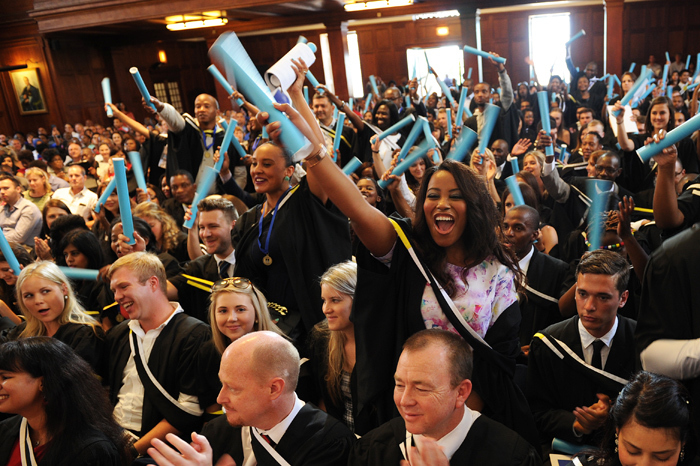Much to celebrate at December's abridged graduation
14 December 2015 | Story by Newsroom
Though the summer graduation has been abridged to only three ceremonies on Saturday 19 December, there's much to celebrate in what has been a year of change for UCT and the country's higher education sector.
Golden Grad
Special mention must be made of the first ceremony at 09h00 when over 50 alumni will participate in the jubilee Golden Grad to mark a half century since they first graduated. After the ceremony they will have lunch with Vice-Chancellor Dr Max Price and enjoy a campus tour in the afternoon.
Social Responsiveness Awards
Among the awards that will be conferred on the day are the Vice-Chancellor's Social Responsiveness Awards to candidates who promote scholarship and teaching that not only enhances UCT's reputation but directly benefits society.
This year's awardees are the Bertha Centre for Social Innovation and Entrepreneurship at the Graduate School of Business, and Associate Professor Roshan Galvaan and Liesl Peters of the Division of Occupational Therapy.
President of Convocation Medal
Another highlight will be the award of the President of Convocation Medal to attorney Mda Mda (92). This medal is awarded annually by the President of Convocation to an alumnus who has contributed to the common good of society. Born in the Eastern Cape, Mda matriculated from Lovedale College in 1940 and completed his BA degree from Fort Hare, where he also obtained a Diploma in Education.
In 1944, he enrolled at UCT's law faculty for an LLB degree. However, he was unable to complete this qualification and gave up his dream of becoming advocate.
Two years later, Mda joined law firm Gush Muggleston & Heathcore as an articled clerk back in Mthatha and with six years' experience, started practising as an attorney in Mqanduli, a small town nearby.
Through a series of challenges and successes, he practised as an attorney until 2001, when he retired.
Even at 92, Mda remains active in the law fraternity as an advisor and mentor.
Honorary doctorates
UCT will also confer two honorary doctorates at the afternoon's ceremony (for the science, commerce and law faculties) to economist Dr Johannes de Villiers (Jan) Graaff and pre-eminent jurist Professor Kenneth Reid.
Graaff will be honoured posthumously for his contribution to economics, both locally and internationally, over half a century. During a career of engaged scholarship, Graaff was able to show the links between the abstract theory of classical welfare and the practical challenges of the real world. His contributions to scholarship and to the practical affairs of South Africa have been remarkable.
The neoclassical South African welfare economist graduated with a PhD from the University of Cambridge in 1950, and attained greater eminence in academic economics than any other South African. His 1957 book on taxation, inequality and poverty, Theoretical Welfare Economics, is described in its preface by Nobel laureate Paul Samuelson as “a classic in its own time”.
While Graaff pursued a career in business (he was chairperson of Nedbank), he continued to write on economic theory and was highly esteemed in the academy. Much of his work has addressed practical issues of income distribution and tax reform. He was a member of the Margo Commission (1984), Katz Commission (1994 - 1997) and the Tax Advisory Committee. He also served on the Economic Advisory Council and the Competition Board.
A pre-eminent jurist, Reid will be lauded for his pivotal role over the past two decades in the promotion of private law scholarship at a local, regional and global level. He is a graduate of the universities of Cambridge and Edinburgh and holds the Chair in Scots Law at the latter. As an internationally renowned scholar of property law and comparative law his work has had a profound impact on law and legal scholarship.
Reid's most outstanding accomplishment has been the abolition of the feudal system in Scotland (2004). He was a Commissioner of the Scottish Law Commission and for a decade directed the drafting of the statutes necessary to replace the feudal system.
He is also a leading scholar of mixed legal systems and this aspect of his scholarship has involved a number of South Africans. His collaboration with South African scholars (many at UCT) since 1994 has led to a number of productive joint academic projects, including the volume Mixed Legal Systems in Comparative Perspective: Property and obligations in Scotland and South Africa (Oxford, 2004).
UCT Fellows
Six new UCT Fellows were recognised by the UCT Council for distinguished academic work and will be honoured at the graduation. They are Professors Renée Kraan-Korteweg (Department of Astronomy), Val Mizrahi (Institute for Infectious Disease and Molecular Medicine and Department of Pathology), Bongani Mayosi (Department of Medicine), Gary Maartens (Division of Clinical Pharmacology), Raj Ramesar (UCT/MRC Human Genetics Research Unit, Division of Human Genetics, Departments of Pathology and Medicine), and Keertan Dheda (Division of Pulmonology).
Compiled by Helen Swingler. Photo by Michael Hammond.
All graduation ceremonies will be live streamed from the UCT Homepage.
 This work is licensed under a Creative Commons Attribution-NoDerivatives 4.0 International License.
This work is licensed under a Creative Commons Attribution-NoDerivatives 4.0 International License.
Please view the republishing articles page for more information.










